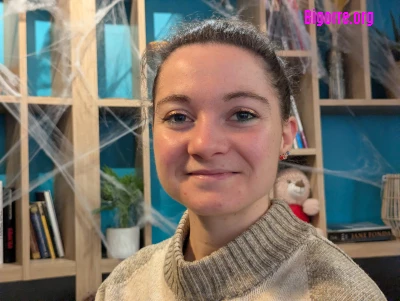How has your life as an artist been since graduating from art school?
I graduated from art school last July and started by finding a job that also allowed me to pursue my artistic life. I'm a part-time supervisor at the Lycée Marie Curie, which frees up all my school holidays. This allows me to live comfortably enough to be an artist. I'm not strapped for cash, I can buy the materials I need, and I don't have to chase after residencies and exhibitions at all costs. It's a kind of temporal comfort.
What is your artistic project?
I work with sculpture, ceramics, and mixed media. I'm generally interested in science fiction, the cosmos, and the Anthropocene. I explore the connection with what's happening on Earth, the link between the natural and the artificial. In my immersive installation, the viewer's space and the space of my project intertwine. But I also feel very free to explore other avenues.
Does art school prepare you for what comes next?
We didn't receive much information about professional careers after art school. Just one meeting at the end of the fifth year. That's why I tried to gather as much information as possible by asking the professors and doing my own research. The alumni association of the Limoges School of Fine Arts, where I was before coming to Tarbes, contacted the artists' associations, CAAP and FRAAP, to organize a video conference on the topic of professional careers. And that's when I really understood how complicated it was!
What path did you take?
I went through the Pass’Artiste program at Tiers-Lieux en Bigorre in Bagnères, Le Lien in Ibos, and Amassa in Lourdes. There were about ten of us artists of all ages and disciplines, some with fine arts backgrounds, others without. We spent eight months in a mentorship program where they explained in detail how to become professional and learn about the networks an artist needs. This allowed me to approach professionalization with confidence, to go to the INPI (National Institute of Industrial Property), the single point of contact for business formalities, to register my business so that I could be officially registered as an artist-author with the URSSAF (French social security agency) and the tax authorities. Now, when I receive a letter from the URSSAF, I'm not even panicking. I was lucky to have this training because there are so many people who hit a wall when they leave art school.
And what about your life as an artist?
No, of course not. I'm currently setting up my studio again because I've moved. I've always managed, ever since school, to afford my own tools and be able to carry out my projects. I still buy my tools with my supervisor's salary. That's why I talk about economic work and not just work to make ends meet. For my ceramics, I know I can go to Marie Izaac Lacrampe's Fab'art in Séméac. It's only the artist residencies that are more complicated because I've discovered they're always outside of school holidays.
